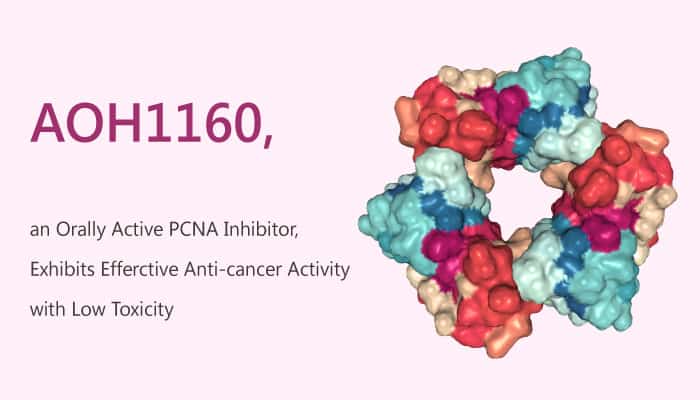Proliferating cell nuclear antigen (PCNA) is an auxiliary protein of DNA polymerase delta. PCNA plays an essential role in regulating DNA synthesis and repair and is indispensable to cancer cell growth and survival. In this study, Long Gu, et al identified a potent PCNA inhibitor AOH1160 by targeting a surface pocket partly delineated by the L126-Y133 region. Especially, AOH1160 selectively kills many types of cancer cells at below micromolar concentrations without causing significant toxicity to a broad range of nonmalignant cells.

Mechanistically, AOH1160 interferes with DNA replication, blocks homologous recombination-mediated DNA repair, and causes cell-cycle arrest. In particular, AOH1160 might exert its effect by changing the subtle dynamics between PCNA and its binding partners. Besides, AOH1160 induces apoptosis in cancer cells and sensitizes them to Cisplatin treatment. Therapeutically, AOH1160 is orally available to animals and suppresses tumor growth in a dosage form compatible with clinical applications. Importantly, AOH1160 does not cause significant toxicity at 2.5 times an effective dose.
In summary, PCNA is central to broad cellular processes. PCNA also is indispensable to the growth and survival of all cancer cells, without causing unacceptable toxicity. The favorable pharmacologic and therapeutic properties of AOH1160 demonstrate the potential of this compound as a broad-spectrum therapeutic agent for cancer treatment. Importantly, AOH1160 has remarkably favorable therapeutic properties. In addition to the potential of AOH1160 to serve as an effective nanotherapeutic agent, its ability to sensitize cancer cells to treatment by DNA-damaging agents significantly improves the efficacy. Moreover, AOH1160 reduceS the dose-limiting side-effects of traditional chemotherapies, such as radiotherapy.